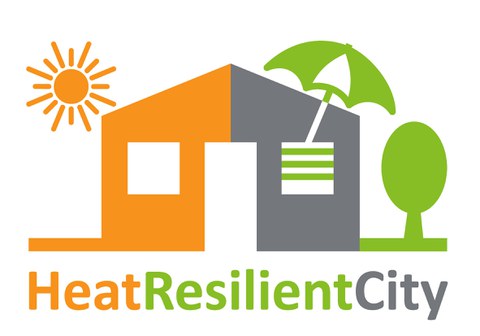23.02.2021
Wohlfühlen trotz Sommerhitze – Forschungsprojekt begleitet praktische Vorsorge und Anpassung in Stadtquartieren
Seit Herbst 2017 untersucht ein interdisziplinäres Team von Forschenden und Praxispartner*innen im Projekt „HeatResilientCity“ (deutsch: hitzeangepasste Stadt), wie sich Stadtquartiere und Gebäude besser an Sommerhitze anpassen lassen. Nun fördert das Bundesministerium für Bildung und Forschung (BMBF) das Projekt für weitere zwei Jahre. In Phase II geht es um die praktische Umsetzung von Anpassungsmaßnahmen. In den Blick nimmt das Projekt dabei auch das Thema Gesundheit.
Beraten, qualifizieren, umsetzen – das steht im Mittelpunkt des Projektes „HeatResilientCity II“. Ziel ist es dabei, viele Praxis-Akteur*innen mit dem Thema Hitzeanpassung in Stadtquartieren vertraut zu machen, neue Netzwerke zu bilden und gemeinsam geeignete Werkzeuge und Entscheidungshilfen für die Stadt- und Freiraumplanung, aber auch das individuelle Handeln von Bürgerinnen und Bürgern zu entwickeln.
Zum Projektkonsortium gehören dabei weiterhin das Leibniz-Institut für ökologische Raumentwicklung, welches das Projekt koordiniert, die Technische Universität Dresden, die Hochschule für Technik und Wirtschaft Dresden, das Institut für Stadtforschung, Planung und Kommunikation der Fachhochschule Erfurt sowie die Landeshauptstädte Dresden und Erfurt. Neu im Projektteam ist das Amt für Gesundheit und Prävention der Stadt Dresden. Auch das Erfurter Gesundheitsamt und die Großvermieter Eisenbahner-Wohnungsbaugenossenschaft Dresden und Wohnungsbaugenossenschaft Zukunft Erfurt werden im Projekt mitwirken.
Das in Phase I des Projektes von Oktober 2017 bis Januar 2021 erarbeitete Wissen rund um die Anpassung an Sommerhitze in Stadtquartieren und einzelnen Gebäuden soll in Phase II gezielt in die Breite getragen werden. Geplant sind Informations- und Qualifizierungsangebote für Mitarbeitende in kommunalen Verwaltungen, aber auch für Fachverbände, Stadtparlamente, Gebäudeeigentümer und -verwaltungen sowie die breite Bevölkerung. Gemeinsam mit den Stadtverwaltungen von Dresden und Erfurt wird dabei genau geprüft, welche Hemmnisse überwunden werden müssen, um das Thema Prävention und Hitzeanpassung in kommunales Handeln überführen zu können und auch eine bessere Kooperation über Ämtergrenzen hinweg zu erreichen. Die Verwaltungen werden die wissenschaftlichen Partnereinrichtungen außerdem dabei unterstützen, digitale Datenangebote, Instrumente und Planungshilfen zu erarbeiten. Diese sollen es künftig erleichtern, Stadträume mit dringendem Handlungsbedarf zu identifizieren und die Wirksamkeit von verschiedenen Maßnahmen abzuschätzen und zu bewerten.
In der Fortführung des Projektes soll das Thema Gesundheit stärker als bisher beleuchtet werden. Lange Hitzeperioden im Sommer wirken sich schon heute vielerorts negativ auf das Wohlbefinden und die Gesundheit großer Bevölkerungsteile aus. Unter anderem soll ein Gesundheitsnetzwerk „Hitzeprävention“ entstehen und in einem Handbuch wichtige Informationen für Multiplikator*innen zusammengetragen werden.
Die Forschungsarbeiten aus der ersten Projektphase werden in „HeatResilientCity II“ fortgeführt und vertieft. So wird etwa geprüft, wie sich Erkenntnisse aus den untersuchten Stadtquartieren in Dresden und Erfurt auch auf andere Klimaregionen und Stadtstrukturen in Deutschland übertragen lassen. Ebenso sollen bereits erprobte Analysemethoden, mit denen sich die Auswirkungen von Sommerhitze auf Gebäude beurteilen lassen, auf weitere Gebäudetypen angewendet werden. Damit lässt sich die Hitzebelastung verschiedener Gebäudetypologien vergleichen. Welchen Einfluss unterschiedliche Anpassungsmaßnahmen im Freiraum auf die Hitzebelastung im Gebäude haben, wird ebenfalls im Projekt analysiert.
Hintergrund
Das Projekt „HeatResilientCity II“ (Hitzeanpassung urbaner Gebäude- und Siedlungsstrukturtypen – Akteursorientierte Umsetzungsbegleitung zur Stärkung der Klimaresilienz und Gesundheitsvorsorge) wird vom Bundesministerium für Bildung und Forschung (BMBF) als Vorhaben der „Leitinitiative Zukunftsstadt“ im Themenbereich „Klimaresilienz durch Handeln in Stadt und Region“ gefördert. Für die Laufzeit von Februar 2021 bis Januar 2023 erhält das Projekt insgesamt rund 1,5 Millionen Euro. Wissenschaftliche Partnereinrichtungen sind das Leibniz-Institut für ökologische Raumentwicklung (Verbundleitung), das Institut für Stadtforschung, Planung und Kommunikation der Fachhochschule Erfurt (ISP), die Professur für Meteorologie an der Technischen Universität Dresden und die Hochschule für Technik und Wirtschaft Dresden, Professur Bauphysik/Bauklimatik und Raumlufttechnik sowie Professur Baukonstruktion. Praxispartner sind die Landeshauptstadt Dresden, Umweltamt sowie Amt für Gesundheit und Prävention und die Landeshauptstadt Erfurt, Umwelt- und Naturschutzamt. Assoziierte Partner sind das Gesundheitsamt der Landeshauptstadt Erfurt sowie die Eisenbahner-Wohnungsbaugenossenschaft eG in Dresden und die Wohnungsbaugenossenschaft Zukunft eG in Erfurt.
Internetseite des Projektes: http://heatresilientcity.de
Informationen für Journalisten:
TU Dresden / Professur für Meteorologie
Dr. Astrid Ziemann
Dr. Valeri Goldberg

